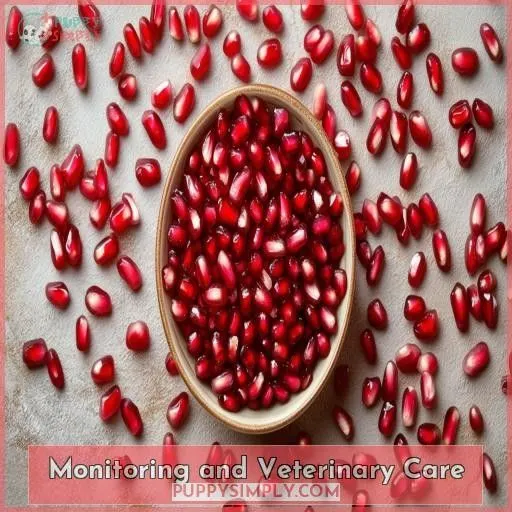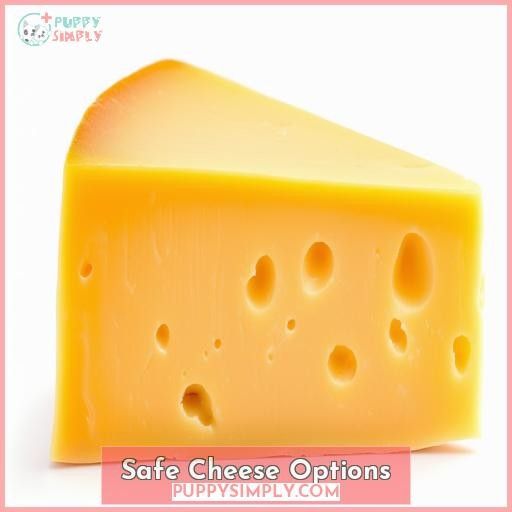This site is supported by our readers. We may earn a commission, at no cost to you, if you purchase through links.
 Yes, dogs can eat American cheese in moderation, but it’s not the best choice.
Yes, dogs can eat American cheese in moderation, but it’s not the best choice.
American cheese is high in fat, which can lead to gastrointestinal issues like vomiting or diarrhea, especially in smaller pooches. However, it’s generally non-toxic and will likely pass through their system without major problems.
If your pup does experience tummy troubles, try bland foods, yogurt, or Pepcid to settle their stomach.
While American cheese provides some nutrients, safer cheese choices lower in fat, like mozzarella or cottage cheese, are better for your furry friend’s health.
Want to learn more about appropriate cheese options for Fido?
Table Of Contents
- Key Takeaways
- Can Dogs Eat American Cheese?
- Toxicity of American Cheese
- Wrapper Safety
- Potential Gastrointestinal Upset
- Tips for Mild Tummy Upset
- Monitoring and Veterinary Care
- Benefits of Cheese
- Risks of Cheese
- Safe Cheese Options
- Frequently Asked Questions (FAQs)
- Is American cheese ok for dogs to eat?
- What cheese can dogs not eat?
- Can dogs eat Kraft singles?
- How much cheese can a dog eat?
- How much American cheese is too much?
- Can puppies eat American cheese safely?
- Is American cheese high in sodium?
- Are there healthier cheese alternatives for dogs?
- What are signs of lactose intolerance in dogs?
- Conclusion
Key Takeaways
- American cheese flows down the canine culinary river, carrying nutrients, but watch out for the fat rapids – moderation is key for your pup’s waistline adventure!
- While cheese offers paw-some protein, calcium, and vitamin A, those with Lactose intolerance may face digestive distress – keep an eye out for gas, bloating, or other rumbly tummy troubles.
- For a safe snack, opt for lower-fat cheese varieties like mozzarella or cottage cheese. They’ll keep your furry friend’s taste buds and health in tip-top shape.
- Remember, an ounce of prevention is worth a pound of cure. Monitor your pup closely for any adverse reactions and consult your vet if tummy troubles persist after introducing new dairy treats.
Can Dogs Eat American Cheese?
Yes, dogs can eat American cheese in small amounts as an occasional treat. However, it should be given sparingly due to its high fat and sodium content, which can lead to gastrointestinal upset and potential health issues like obesity or pancreatitis.
Toxicity of American Cheese
American cheese doesn’t contain any toxic ingredients that could harm your dog. However, larger dogs are less likely to experience digestive issues from eating American cheese compared to smaller dogs.
No Toxic Ingredients for Dogs
Don’t worry, American cheese doesn’t contain any toxic ingredients for dogs. However, consider your pup’s allergies and lactose intolerance before serving it as a training treat or topper. If your dog has no issues with dairy products, American cheese in proper portion size promotes dental health without causing digestive issues.
Larger Dogs Less Likely to Experience Issues
While American cheese isn’t toxic for dogs, larger pups have an advantage. Their size means they’re less prone to issues from lactose intolerance or excess fat and calories. Still, moderation is key – even big dogs can experience gastrointestinal upset from too much cheese. Pay attention to portion sizes to keep your furry friend happy and healthy.
Wrapper Safety
The plastic wrapper used on some American cheese products is generally considered safe for dogs if ingested accidentally. While not recommended, the wrapper typically passes through the digestive tract without causing significant issues in most cases.
Rarely Causes Problems
You can safely give your dog American cheese – the wrapper rarely causes issues. However, dogs with lactose sensitivity or pancreatitis risk should avoid American and other high-fat cheeses like blue cheese. Opt for low-lactose options like cottage cheese, cream cheese, or soft goat cheese instead, and always consult your vet.
Typically Passes Through Digestive Tract Without Incident
You needn’t worry about the wrapper—it’ll likely pass through your pup’s digestive system without issue. Just be mindful that:
- Smaller dogs face higher risks.
- Moderation is key for good nutrition.
- Stick to string cheese or low-fat varieties.
With care, American cheese can be an occasional, safe treat for Fido.
Potential Gastrointestinal Upset
While American cheese isn’t toxic for most dogs, its high fat content can potentially lead to vomiting or diarrhea in some canine companions. However, these gastrointestinal upsets are typically mild and transient, resolving on their own without the need for serious intervention.
Vomiting or Diarrhea Possible in Some Dogs
While cheese offers vitamins and minerals, its consumption can trigger digestive issues like vomiting or diarrhea in some dogs, especially those with lactose intolerances. Veterinary consultation and dietary adjustments may help mitigate these risks.
Transient and Usually Resolves on Its Own
Usually, any gastrointestinal upset from mild cheese intolerance is transient, with symptoms subsiding quickly without long-term effects. Preventative dietary measures can help avoid even mild symptoms.
Not Typically Serious
Gastrointestinal problems from American cheese are usually mild – a little vomiting or diarrhea that resolves quickly. With simple dietary modifications like bland meals and probiotics, your pup’s tummy troubles won’t last. Don’t sweat minor digestive issues – they’re typically transient nuisances.
Tips for Mild Tummy Upset
If your dog experiences mild gastrointestinal upset after consuming American cheese, you can provide them with Pepcid (famotidine) to help reduce symptoms like vomiting or diarrhea. Modifying their diet by feeding bland foods like boiled chicken and rice, along with live yogurt to restore gut bacteria balance, can also help rest their intestinal tract during this time.
Pepcid (famotidine) Can Help Reduce Symptoms
If your pup experiences mild vomiting or diarrhea after eating American cheese, you can help reduce symptoms by giving Pepcid (famotidine):
- Safe, over-the-counter antacid medication
- Blocks stomach acid production
- Reduces nausea, vomiting, and diarrhea
- Follow dosage instructions carefully
Diet Modification Can Rest Intestinal Tract
If your pup has a sensitive tummy, you can modify their diet by limiting cheese and other dairy products. This rests the intestinal tract and eases Gastrointestinal issues like diarrhea or vomiting.
Live Yogurt Can Restore Gut Bacteria Balance
If the tummy troubles persist, try live yogurt – it’s a probiotic-rich dietary supplement that can help restore your pup’s intestinal balance and gut bacteria for ideal digestive health.
Monitoring and Veterinary Care
You should closely monitor your dog for any signs of distress after consuming American cheese. If your dog exhibits symptoms like vomiting, diarrhea, or lethargy, contact your veterinarian promptly, as these could indicate a more serious condition that requires professional medical attention.
Observe Dog for Signs of Distress
If your dog exhibits signs of distress, like vomiting, diarrhea, or lethargy after consuming cheese, closely monitor their condition. Consider lactose intolerance, cheese allergies, pancreatitis concerns, and moderate feeding.
Contact Vet if Condition Worsens
If your dog’s condition worsens with signs of cheese poisoning, lactose sensitivity or persistent digestive upset, don’t hesitate – contact your vet for guidance and assessment of potential pancreatitis risk.
Seek Veterinary Attention Promptly if Significant Deterioration Occurs
If your dog exhibits alarming symptoms like severe vomiting or diarrhea after ingesting cheese, seek prompt veterinary care. Provide details on ingredients and amounts consumed to aid diagnosis and treatment.
Benefits of Cheese
You’ll find that cheese offers several nutritional benefits for dogs. It’s a good source of protein, calcium, vitamin A, essential fatty acids, and B-complex vitamins that support overall health.
Contains Protein
In addition to calcium, cheese provides protein—an essential nutrient dogs need. It’s a high-quality protein source rich in amino acids for muscle building, energy production, and growth.
Contains Calcium
Calcium aids your pup’s robust bone density, promoting strong teeth and proper calcium absorption – essential for preventing osteoporosis, dental caries, and calcium deficiencies.
Contains Vitamin A
Vitamin A in cheese supports eye health, immune function, skin health, coat health, and nervous system function.
Contains Essential Fatty Acids
Another benefit of cheese for dogs is its content of essential fatty acids, which promote heart health. However, you must consider potential allergies when feeding cheese.
Contains B-complex Vitamins
You’ll find B-complex vitamins in cheese, too.
- Essential for energy production
- Support red blood cells
- Promote healthy skin/hair
- Boost brain function
- Aid stress management
Risks of Cheese
While cheese can provide nutrients like protein, calcium, and vitamins, you’ll want to be cautious with high-fat varieties like American cheese. These cheeses are calorie-dense and can contribute to weight gain, obesity, and even pancreatitis in dogs, especially if consumed excessively or if your dog has certain health conditions.
High in Fat
You’re right, cheese is high in fat. Too much can increase obesity, weight gain risk. The fat content also raises chances of pancreatitis issues.
Can Cause Weight Gain
Overfeeding cheese can pack on pounds due to its high calorie density. Careful portion control and weight management become essential.
Can Lead to Obesity
If your dog overeats cheese, it can lead to obesity due to:
- High fat content
- Excess calorie intake
- Lack of nutritional balance
- Unhealthy weight gain
Follow dietary guidelines for safe cheese consumption as an occasional treat.
Can Lead to Pancreatitis
Cheese’s high fat content increases canine pancreatitis risk with excess calorie intake. Opt for low-fat dairy alternatives to avoid digestive sensitivity and inflammatory responses.
May Contain Toxic Ingredients
Some cheeses may contain toxic ingredients like preservatives that can upset your pup’s tummy and potentially cause weight gain or digestive issues like pancreatitis.
Safe Cheese Options
For dogs that can tolerate dairy, mozzarella, cottage cheese, and soft goat cheese are safe cheese options as they’re low in fat and sodium. Choosing these types of cheeses in moderate portions can provide beneficial nutrients while minimizing potential issues associated with higher-fat, higher-sodium varieties.
Mozzarella
You can safely give mozzarella to your dog. This cheese is:
- Low in lactose
- High in protein, calcium
- Good for dental health
- Best served in moderation
Cottage Cheese
Try cottage cheese, a low-fat, protein-packed cheese.
| Pros | Cons |
|---|---|
| Low lactose | Bland taste |
| Good protein source | High sodium |
| Aids dental health | — |
| Digestive benefits | — |
| High calcium content | — |
Soft Goat Cheese
Soft goat cheese is a safe, nutrient-dense option for dogs. Lower in lactose, easier to digest, hypoallergenic.
Low in Fat
Low-fat cheeses offer a delicious way to enjoy dairy’s benefits without worrying about excessive calorie count or unhealthy fat intake.
Low in Sodium
Choose low-sodium cheeses like cottage cheese or fresh mozzarella to reap health benefits without excess sodium hindering your pup’s weight management.
Frequently Asked Questions (FAQs)
Is American cheese ok for dogs to eat?
Like a nutritious river, American cheese flows with protein and calcium – great for strong pups. But watch the fat rapids; moderation is key for your dog’s waistline adventure.
What cheese can dogs not eat?
You’ll want to avoid cheeses with toxic ingredients like onions, garlic, and high salt levels. Blue cheeses, processed cheese foods, and aged cheeses like roquefort can be harmful for your pup.
Can dogs eat Kraft singles?
Coincidentally, you’re asking about Kraft singles – yes, dogs can eat them in moderation. They’re processed cheese, so stick to small amounts as treats to avoid potential digestive upset or weight gain.
How much cheese can a dog eat?
You can give your pup small amounts of cheese as an occasional treat. Stick to low-fat varieties like cottage cheese or mozzarella. Feed no more than one ounce daily for every 10 lbs of body weight to avoid digestive upset.
How much American cheese is too much?
While dogs can safely eat small amounts of American cheese, more than an ounce per day is too much and may cause gastrointestinal upset, weight gain, or pancreatitis. Monitor portion sizes closely.
Can puppies eat American cheese safely?
Like a forbidden fruit, American cheese may tempt puppies with its alluring taste. However, it’s best reserved for adult canine companions – puppies’ delicate digestive systems may struggle with its richness. Stick to puppy-formulated treats until their tummies mature.
Is American cheese high in sodium?
Yes, American cheese tends to be high in sodium. It’s best to limit this cheese for dogs, as excess sodium can lead to dehydration, high blood pressure, and other health issues. Low-sodium cheeses like cottage cheese are a safer choice for occasional dog treats.
Are there healthier cheese alternatives for dogs?
You’re right to contemplate healthier cheese options for your pup. Low-fat cheeses like cottage cheese, ricotta, and fresh mozzarella are great alternatives that provide nutritional benefits without excessive fat or sodium.
What are signs of lactose intolerance in dogs?
As the old adage goes, "An ounce of prevention is worth a pound of cure." Signs of lactose intolerance in dogs include gas, bloating, diarrhea, and vomiting after consuming dairy products. Monitor your pup closely for any adverse reactions.
Conclusion
To investigate if dogs can eat American cheese, it’s evident that while it’s generally non-toxic, consuming too much can lead to gastrointestinal issues like vomiting or diarrhea.
You’re better off offering safer cheese options lower in fat, such as mozzarella or cottage cheese, to avoid potential weight gain or pancreatitis.
Moderation is key when sharing American cheese with your furry friend.














